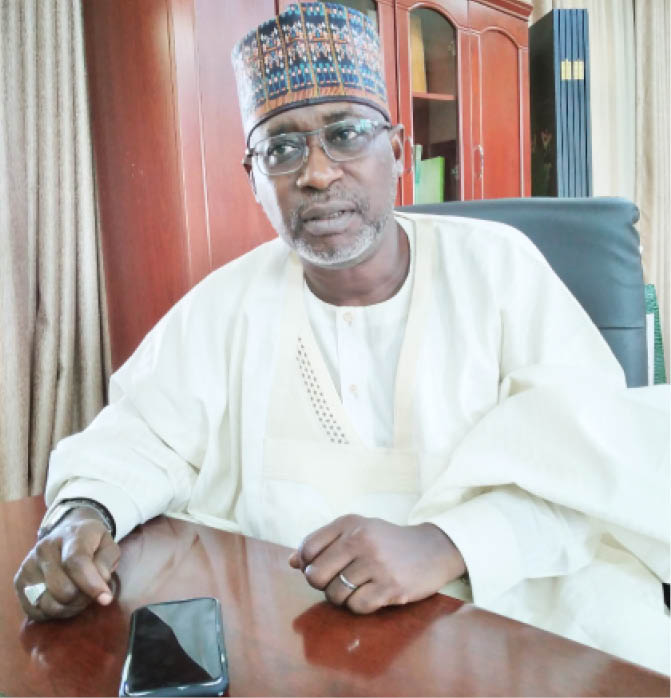Engineer Suleiman H. Adamu is the Minister of Water Resources. In this exclusive interview, he speaks on the controversies trailing the proposed Water Resources bill, explaining why Nigerians should be happy to have the bill passed.
The reigning issue as far as the ministry is concerned is that of water resources bill, what is the state of the bill now?
Well, the bill passed second reading in the House in July this year and some points were raised and it was required that it has to go through gazetting and it has been gazetted. I have a copy of the gazetted bill, which is going to be sent back to the House for consideration and we have had a very good meeting with members of the house committee on water to explain things to them.
It’s unfortunate that some people, for reasons best known to them, decided to politicise this bill to confuse people with a lot of fabrications, knowing that some Nigerians are gullible, they decided to spread disinformation about the bill simply to achieve some political points. I am a water professional and the minister of water resources and it is my duty and responsibility to ensure that I bring out what is best for the water sector in the interest of the country.
There is nothing in this bill about taking any land from the state government. A hundred per cent of all the things that have been peddled about this bill are lies. Saying that we are going to take over lands of the rivers it is not true, saying that is about inland waterway navigation, it has nothing to do with it. Saying that it is a power grab for the federal government, the constitution is already clear about who controls the water resources of this country that transcends over one state. The bill itself is just a compilation of the existing laws into one book so if that is what it is all about, why hasn’t the federal government taken over Nike lake in Enugu? Why hasn’t it taken over Oguta Lake in Imo State? The bill is just talking about rivers or water bodies that cut across one state and the whole idea is to protect downstream users.
If you are in the upstream and somebody is in the downstream, you don’t have more right over him. You have equal rights so you take your bit and he takes his bit. But if there is no big brother to protect him in the federal government then he may lose and that is why, especially people of the Niger Delta, should be very glad that there is a law like this because, without that, they cannot be protected. They are at the extreme of River Niger. Even in Nigeria, we have to go and help create the Niger Basin Authority with nine other countries because River Niger starts from Guinea and passes through seven countries. If Guinea says it is going to dam River Niger, we would not be having the Kainji Dam, we will not be having Lokoja, we would probably end up with River Benue and the entire civilization around the bifurcation and the Delta in this country would have been suffocated
Maybe people are not sure yet of the economic benefits of the bill… [Cuts in.]
Number one: this bill seeks to empower the citizenry to have a say in how water resources are managed and developed within a particular catchment. That is to say, if we are going to build a hydropower scheme, if you want to build a dam, if you want to have a light-scale irrigation project, the communities around that place will have to come together, there will be a town hall meeting where you will explain to them how much water is going to be taken, how it will affect them and how we will mitigate the risk against them and we must make sure that the water is not degrading the ecosystem. It means they must have a proper impact, environmental assessment and the people have to be convinced that this project is for their benefits. So when you have citizen empowerment, what is wrong with that?
Number two: there is a provision in the bill that will empower irrigation farmers to organise themselves into water users association, and maintain irrigation facilities, the secondary and tertiary irrigation facilities. They will be responsible for their own plots of land, they will be empowered to collect money and work within themselves to improve the irrigation facilities and then the government will handle the dams and the main canal, that way, you enhance production, you ensure the irrigation continues and are better managed.
Number three: in this bill, there is a provision for WASH fund, that is the Water Sanitation and Hygiene Fund. We were discussing how states are unable to provide water to their people because states are not investing enough, we couldn’t meet the millennium development goals and, as I told you, I gave you the statistics from 30% we drop to 7% in pipe-borne water. That is why we developed the wash action plan and that was why President Buhari declared the state of emergency on the water sanitation and hygiene sector. Now, in that wash action plan, we recommended that there should be a WASH fund that will enable states to come and get some money, whether it is a loan or whether it’s a grant whatever it is, they have access to funds that they can use to improve the water supply and sanitation situation in the state, is that bad?
Finally, the fourth major issue we already have a regulatory commission, the Nigeria Integrated Water Resources Management Commission, so this bill is not creating any agency at all. All the agencies are existing but what we are saying is let us strengthen, this regulatory agency to make it independent. Now they are operating based on delegated power of the minister, which as a minister I can say okay, I’m taking my powers back at any time if I want to. But when this bill is passed into law, that commission becomes independent, and if you have an independent regulatory body, it will give the private sector the confidence to come and invest in the water sector.
How optimistic are you this bill will not bounce back at the National Assembly? And then finally there is this insinuation that people who dug boreholes in their houses will be asked to pay with this proposed bill. How true is it?
It is not true that they will be paying. It is clear in the bill that if you have a pond or you drill a borehole for domestic use, nobody is charging you anything.
I told you everything they said is a fabrication. Commercial users, that is, those that drill industrial boreholes, they are using borehole water and some of them are not paying a dime, so you have to license them. They take a lot of water at the expense of the people, they have to be licensed. We have to know how much water they are taking. How can you have a system that is not regulated? If they are using it for business, why shouldn’t they pay for it? Water is a mineral, it is the same principle you use to drill for oil that you are drilling for water. Is it because water falls from the sky that is why you think it is free? It is only free if it is flowing in the river and you go and take, then it is your own and the bill says even if you have stream around your farm, you can tap the water and use it without any challenge but if you now have a farm that is 10,000 hectares, you are going to take thousands upon thousands of cubic water to irrigate the farm. How can we allow that? It is not done? No country in the world allows it.

 Join Daily Trust WhatsApp Community For Quick Access To News and Happenings Around You.
Join Daily Trust WhatsApp Community For Quick Access To News and Happenings Around You.

